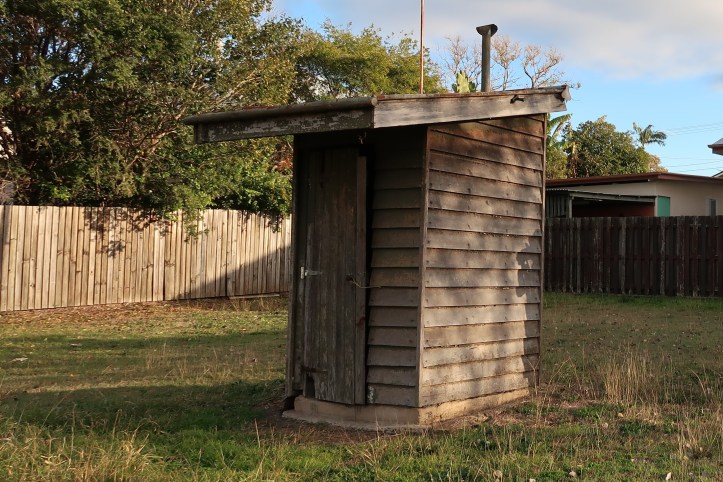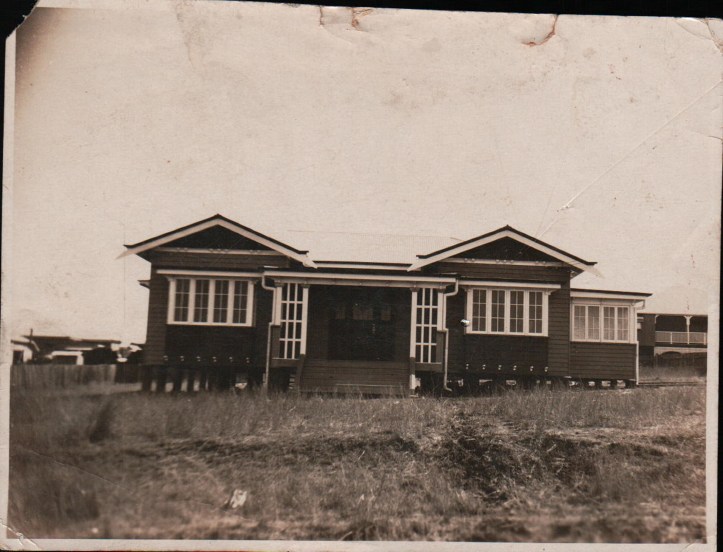
The history of the Australian dunny is compelling, and the opportunity to research one that still stands in a back yard is not to be missed. So, with my Minelab metal detector in hand, I was delighted to help Kelly discover more about the near-century-old house that she’s renovating and growing to love.
Known as the Sunshine State Home Kelly is documenting the renovation of her 1929 home in the Ipswich suburb of Booval. She researched the land titles and reached out through social media to the family of the original residents and was given old photographs.
On my preparatory field walk, there it was, the outhouse still standing tall in the back yard. It’s been largely undisturbed since it was built ninety-one years ago. It may have been upgraded with a chain flush and a concrete floor, but other than that, it represented a moment frozen in time. Who had opened the door and passed through its hallowed entrance?

The house was founded by the Phillips family. Patriarch Fred Phillips came to Australia from Gloucestershire, England, in 1864. He joined the Independent Order of Rechabites and from the age of sixteen worked with the department store Cribb and Foote for a remarkable fifty-five years. Fred lived on Mary Street in Ipswich for most of his life where he and his wife Charlotte raised their eight children.
Their oldest son was Francis Hardwick Phillips who was one of the first to enlist for the First World War in 1914. He served as the colour sergeant with the 2nd Light Horse Regiment at Gallipoli and then with the Camel Field Ambulance in Palestine. He came home a captain and hero having been Mentioned in Despatches, recommended for a Military Cross, and awarded an Order of the British Empire.
Francis worked as a chemist and got married in 1921 when he bought three blocks of land in Booval. He moved into Brisbane in 1924 to set up his own chemist in Paddington. That was when Francis’s younger brother Alfred Gordon ‘Gore’ Phillips took over two of his Booval blocks.
In 1929, Gore married Sheila whose brother-in-law Frank Cooper was deputy-mayor of Ipswich and the local member of the Queensland Legislative Assembly. That same year – on his two blocks of land – Gore built a grand home deserving of a large landscaped garden. His brother Francis the decorated chemist would have visited from Brisbane, and his father Fred would have been a regular visitor especially when his grandchildren came on the scene. That is the house Kelly has today.

But with the onset of the Great Depression, the garden was never landscaped – the house and land, and the outhouse out the back, became trapped in time and remained unchanged to the present day.
Gore worked as an electrical fitter. At eighteen he had enlisted during the closing months of the First World War, and come the Second World War and Australia’s most dangerous year in 1942, Gore enlisted again, this time in the home guard Volunteer Defence Corps.
That was the same year that Gore’s brother-in-law Frank Cooper became the premier of Queensland and was an ardent ally of the war effort. Kelly discovered from his family that Gore supported the war effort by hosting soldiers on leave at his Booval home.
Gore’s younger brother Herbert also joined the Volunteer Defence Corps. He later became the general secretary of the Queensland Farmers’ Co-operative Association.

I searched the grounds around Kelly’s house. Together we found pre-decimal coins at the front steps and under windowsills. The most telling were coins from the 1940s unearthed in front of the outhouse alongside a press stud from an old pair of trousers and an Australian Army shoulder badge.
The coins, trousers, and army badge had evidently been lost by the soldiers on leave who were racing to the dunny.

Gore sold his house in 1961 to a linesman with the Postmaster General’s Department, Eric Willoughby, who erected ham radio antennas. It was sold again in 2008 and rented to assorted tenants before being acquired by Kelly this year.
But the outhouse remains, all the time retaining its secrets about supporting Australia’s war effort, stories from 55 years at Cribb and Foote, hosting an OBE recipient, the executive of the Queensland Farmers’ Co-operative, and even a premier of Queensland.
Photo credits:
Outhouse – Sunshine State Home
Booval house in 1929 – Phillips family collection via Sunshine State Home
Alfred Gordon Phillips – Phillips family collection via Sunshine State Home
Prime Minister John Curtin, Queensland governor Sir Leslie Wilson, and Queensland premier Frank Cooper on 19 August 1942 – State Library of Queensland
Booval house metal detecting discoveries – my own

Interesting historySent from the Samsung tablet lovingly given by Harold, Jacqueline, Harold, and Murray
LikeLike